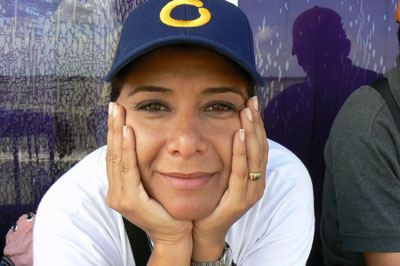Journalism in Venezuela
Aleksander Boyd interviews Delvalle Canelon
La Puerta 24.11.06 | As I was having dinner Delvalle walked into to the restaurant. She was clearly upset. Her colleagues Beatriz Adrian, Jose Luis Ochoa and Edwin Moreno from Globovision were beaten up by Hugo Chavez’ bodyguards while they were reporting the situation of disgruntled homeless folks that were protesting, in front of the presidential residence in La Casona, the lack of diligence of the regime regarding housing solutions. “Jose Luis is the only child and her mother suffers from cancer, he looks after her. Imagine the anguish of her mother upon watching on national TV how her son was being kicked, dragged and beaten up by 3 members of Chavez’s personal security apparatus. Then some of the protesters joined in and also participated in the attacks against the crew” said Delvalle.

Delvalle Canelon is a very tough woman. Born in Maturin she moved to Caracas in 1989 to study journalism. Upon graduation she worked for a number of newspapers and TV channels until in 2000 she was recruited by Globovision. Delvalle has seen it and reported all, from coups d’etat to witnessing assassinations. Her reporting of the April 11 2002 events led to being called upon as witness in criminal investigation trials presented against the assassins of Puente Llaguno that, ultimately, were set free and honoured by Chavez himself as heroes of the revolution.
In 2005 the gag law was passed by the assembly. I asked whether her reporting was in any manner affected by it. “I have to be very careful about what I say now, if we’re broadcasting live pretty much everything goes, however in most cases we don’t so retransmissions are always edited to comply with the discretionary restrictions of the law. For instance if an interviewee of mine swears or makes any comments against the establishment we have to edit that bit, we can’t show images of children and our commentary has changed, we’re very conscious about the legislation, legal teams gave us workshops aimed at warning us about the dos and don’ts. Since I covered the discussions of the law in the national assembly I was invited to share my knowledge in this respect with other colleagues. Now we are not free to comment as we used to for we are aware of the legal consequences. Freedom of the press has definitely being restricted in Venezuela. The restraint is self imposed.”
How do you perceive the incitement to violence and the language of hatred of Hugo Chavez?
As a Venezuelan I feel that what he has done to our country will take years to mend, we were a country of happy people, everyone used to talk and treat each other in friendly manner, what he did was to instil and then exacerbate hatred among us, I remember when I was a child seeing adecos and copeyanos having a laugh with each other, something almost unthinkable today between chavistas and those in the opposition. Chavez is a hypocrite, look at the bankers, some of them are minted, and the phenomenal ill acquired wealth is a direct result of cronyism and good old corruption that continues unabated here. His talk about a revolution aimed at helping the poor and participatory democracy is pure rubbish. Hugo Chavez use the needs of the dispossessed, which were always there, to create a conflict of classes, he introduced successfully in Venezuela the premise that people were poor because of the rich -and not due to the corrupt political establishment- that had robbed the country blind. As a journalist I feel threatened by a regime that has made a point of targeting especially the company I work for. My cameraman Carlos Arroyo and myself have suffered all sorts of violent attacks simply because we work for Globovision and I think what the current administration can not tolerate is that we air the views of disgruntled chavistas. This editorial policy does not bode well for an administration that seeks to present itself as caring, efficient and progressive. The constant attacks from the president show how progressive his administration is...
How do you see the political landscape now that Rosales seems to be gathering momentum?
We are living a very interesting period. The people were lethargic, however an awakening has occurred and it’s all due to the appearance in the national scene of Manuel Rosales. Venezuelans were like hopeless orphans and naturally they leaned towards Rosales without much hesitation. The issue here is rather simple, the whole country is tired of the vitriol and incendiary rhetoric of Chavez, of so called asymmetric wars, of seeing how the incumbent gives away our wealth to other nations whose citizens are better off, in sum we want peace, freedom and stability. Fortunately Rosales shares the feelings of the majority and for that reason we see the optimism and momentum around his ticket.
How do you foresee the business of journalism in Venezuela in a Rosales presidency?
The man is a proven democrat, unlike Chavez who comes from the barracks and does not understand democratic tenets such as freedom of expression and information. I think journalism will return to what it used to be with all its imperfections though the fear of reprisals, the constant attacks by officialdom and sheer hatred that the president himself has instigated against some of us will be remembered as one of the saddest periods of our democracy.
send this article to a friend >>
